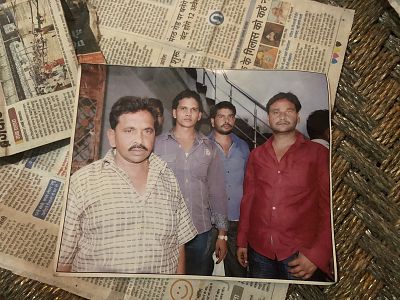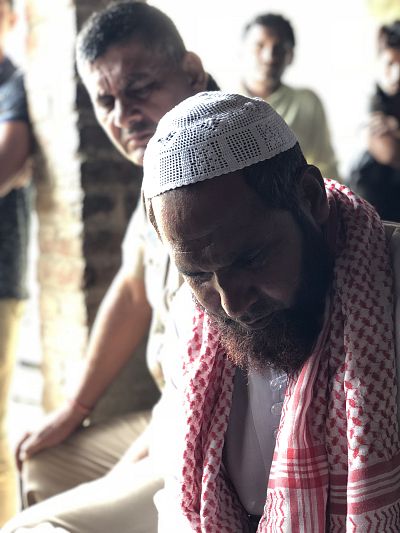A Hindu mob attacked Samaydeen, leaving him battered and bleeding but alive. The case is now a test of whether his country can stem such violence.
MADHAPUR, India — The mob caught up with Qasim Qureshi in a hayfield.
In broad daylight, around 25 attackers kicked and beat him with sticks. Then they watched him die.
According to Qureshi's family, the 45-year-old livestock trader was accused by his killers of slaughtering cows. The animals are revered in India so even rumors of someone transporting one for that purpose can stir deep rage, and mobs of so-called cow protectors have killed at least 20 people this year.
Bringing the guilty to justice can take years because witnesses are often unwilling to testify, and police forces often refuse to follow leads and apprehend vigilantes, according to rights activists and lawyers fighting for victims. They warn that Prime Minister Narendra Modi's right-wing Bharatiya Janata Party (BJP), which swept to power in 2015, has emboldened violent Hindu extremists.
Qureshi's death on the outskirts of this tiny village a two-hour drive east of India's capital, New Delhi, may be a turning point.
The country's Supreme Court has called on the government to consider new laws to help curb the problem, including specific legislation to deal with cow-protecting vigilantes.
During the June 18 attack on Qureshi, a nearby farmer noticed the commotion and ran to help. He was also badly beaten and left for dead.
But the farmer, Samaydeen, lived.
Samaydeen’s testimony is a solitary piece of evidence on which conviction by a court can rest.
"It seemed impossible that he would survive," said Samaydeen's brother Yaseen, who like his sibling goes by one name. "There wasn't a part of him that wasn't bleeding."
Since rallying, Samaydeen has assembled a high-profile legal team to seek justice. After state authorities dragged their feet — while a video of the attack that was widely shared on the internet shows assailants' faces, police have not rounded up suspects — he took his fight all the way to the Supreme Court.
On July 17, India's highest court issued 11 suggestions for how to deal with mob violence and lynching. It has also called on the government to consider new laws to curb the problem across the country, including legislation to deal with cow-protecting vigilantes. After the attack on Qureshi and Samaydeen, the Supreme Court, which both advises and hands down rulings, urged authorities in the state of Uttar Pradesh to investigate the crime with a view to preparing a case against the attackers.
The Supreme Court's suggestions are not compulsory, and a future trial is not a given. State police and officials have not responded to repeated requests for comment.
Still, a lawyer for Samaydeen Vrinda Grover says she sees progress in what she calls a fight against right-wing extremism.
news
That the Supreme Court is considering the case provides "a glimmer of hope, not only to the victim's family … but hope for all citizens who believe this kind of mobocracy is wrong," she said.
The fight has come with a cost.
Tensions are running high in Muslim Madhapur, a cluster of small brick homes dotted along crooked unpaved roads. The village of some 2,200 is encircled by Hindu communities.
Samaydeen has been in hiding since the attack and has not returned to his home, wife and seven children in Madhapur.
His house, a few doors from the neighborhood mosque, now has 24-hour police protection in the form of a barefoot officer lounging on a bed in the building's moss-encrusted courtyard. An old rifle sits tucked under his leg.
His lawyers have advised Samaydeen to stop speaking to journalists. This leaves his brother Yaseen, a quiet bearded man who wears a traditional long tunic over loose pants, to act as his spokesman and receive visitors.
Yaseen is still visibly shaken by what happened to his brother.
Indicating to the police officer on duty, he says, "Why would we need him if we weren't scared?"
At the heart of the problem is that some Hindus view Muslims, the country's largest minority, as simple "cow killers, beef eaters and in that sense, not worthy of protection," says Sanjay Hegde, a prominent lawyer who is fighting several human rights cases.
Because tensions are running so high, "minor incidences" can end up as lynchings, he says.
Nalin Kohli, a national BJP spokesperson, flat out rejects claims that mob violence is being fanned by the ruling party, as many claim. Instead, he says, political opponents are concocting an issue.
"It suits a certain political narrative, particularly a left-leaning, self-styled liberal lot of lawyers and activists" who want to make the BJP look bad at any cost, he says.
News
Meanwhile, Samaydeen's lawyers maintain the investigation was compromised from the start. Uttar Pradesh officials have been under pressure to press charges. Local police initially recorded the incident as a road traffic accident, according to Yaseen and Samaydeen's lawyers.
Samaydeen's lawyers are demanding an investigation led by a special team of senior police from outside of Uttar Pradesh and monitored by the Supreme Court.
If the police do round up members of the mob, which Samaydeen and video evidence can help identify, they have a good chance of getting justice, says Grover, the lawyer.
"Samaydeen's testimony is a solitary piece of evidence on which conviction by a court can rest. He is the injured eyewitness," she said. "The injured eyewitness has very heavy weight in court."
If he gets his day in court, Samaydeen's case may at yet put mobs on notice, driving home that they cannot get away with killing minorities.
But the fight is likely to take years. Hegde, the human rights lawyer, compares the anti-lynching struggle in India to the American civil rights struggle, which took years to help grant U.S. minorities rights and protection.
"It took an entire civil rights movement. It took a Martin Luther King. It took a Thurgood Marshall on the Supreme Court for things to change," he says.














